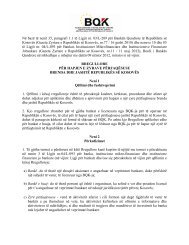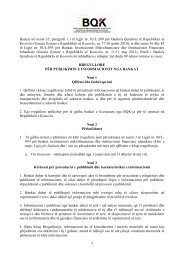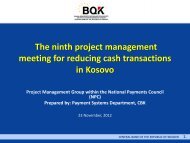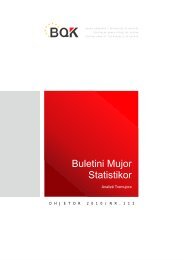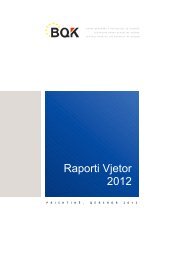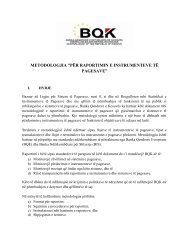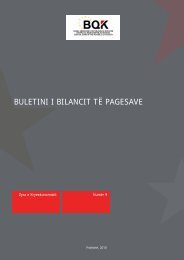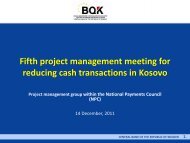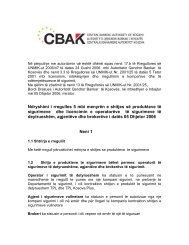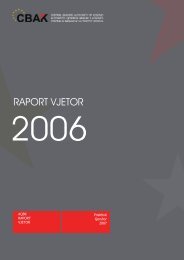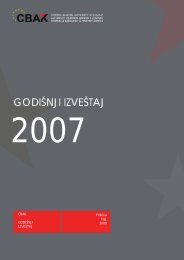Financial Stability Report No1 20 December 2010 - Banka Qendrore ...
Financial Stability Report No1 20 December 2010 - Banka Qendrore ...
Financial Stability Report No1 20 December 2010 - Banka Qendrore ...
You also want an ePaper? Increase the reach of your titles
YUMPU automatically turns print PDFs into web optimized ePapers that Google loves.
Number 1<strong>Financial</strong> <strong>Stability</strong> <strong>Report</strong><strong>20</strong>03. In the survey undertaken for this research, the original NLIS <strong>20</strong>03 questions wereretained in order to generate comparable results with other transition economies.The EBRD approach of assessing the enforcement process focuses on the final stage of thelitigation, i.e. how the collateral disputes are handled by courts. However, as Hendley(<strong>20</strong>01) points out, only a small proportion of disputes ever end up in court because eitherthey are settled or the potential costs of proceeding outweigh the potential benefits. Thelitigation process can be thought as comprising several stages. For example, Cooter andRubinfeld (1989) in their analysis of law recognize four stages of legal disputes: harm,assertion of legal claim, bargaining and trial. Therefore, the questionnaire was extended toexplore other steps of the litigation process not analyzed by the EBRD. It takes into accountthe issue of voluntary compliance on the borrower’s side, the bargaining phase of disputeresolution, a clearer distinction between methods of enforcement (self-help and courtinvolvement) and the existence of a market for collateral.The survey was conducted with four banks composing around 80 percent of total bankingsector assets. The survey was conducted by interviewing banks’ legal experts, loan officersand risk managers. Regarding the scores, when answers were given in a range (e.g. it takestwo to six months to enforce the claim), the average figure is recorded. Subsequently, theanswers by all the respondents are averaged to produce a single score.10.4. ResultsIn this section the results of the survey regarding the enforcement of collateral laws inKosovo are presented and then compared with those of other transition economies.Regarding the 'how much' question (amount), which reflects the likely return on therealisation of the assets pledged as collateral, Kosovo scores 5.5 out of 10; that is, lendersmay expect to recover around 55 percent of the loan in default with the pledged collateral(Table 18). Compared to the results obtained from the same survey in <strong>20</strong>05, actual figuresshow a slight deterioration with regard the amount of loan recovered. Regarding the 'howfast' question (time), which relates to the time needed for completion of the enforcementprocedure, Kosovo scores 8 out of 10; that is, lenders may expect to recover the pledgedcollateral within six months. 17 In terms of the time needed for the recovery of the loan, thesituation appears to be similar to five years ago. For 'simplicity' of the entire enforcementprocess, the score was 5 (of three possible answers: 1, 5 and 10). The reason that 'simplicity'was not scored 10 (the best ranking) was because of the responses related to the functioningof courts: the presence of inexperienced judges to deal with cases, the lack of specialisedcourts, small number of judges, etc. The overall score of the NLIS <strong>20</strong>03 for Kosovo is 18.5(5.5 for the amount, 8 for time and 5 for simplicity), which is for 0.5pp lower compared toyear <strong>20</strong>05.17 A zero score implies that the process is likely to take 24 months or more, and the maximum score 10 when the process is likely to take one month.86 |



